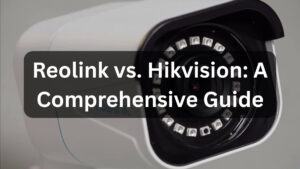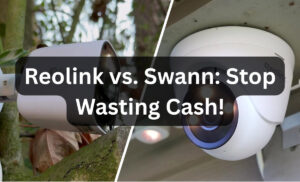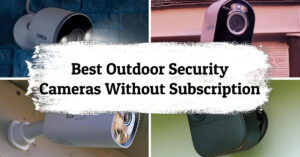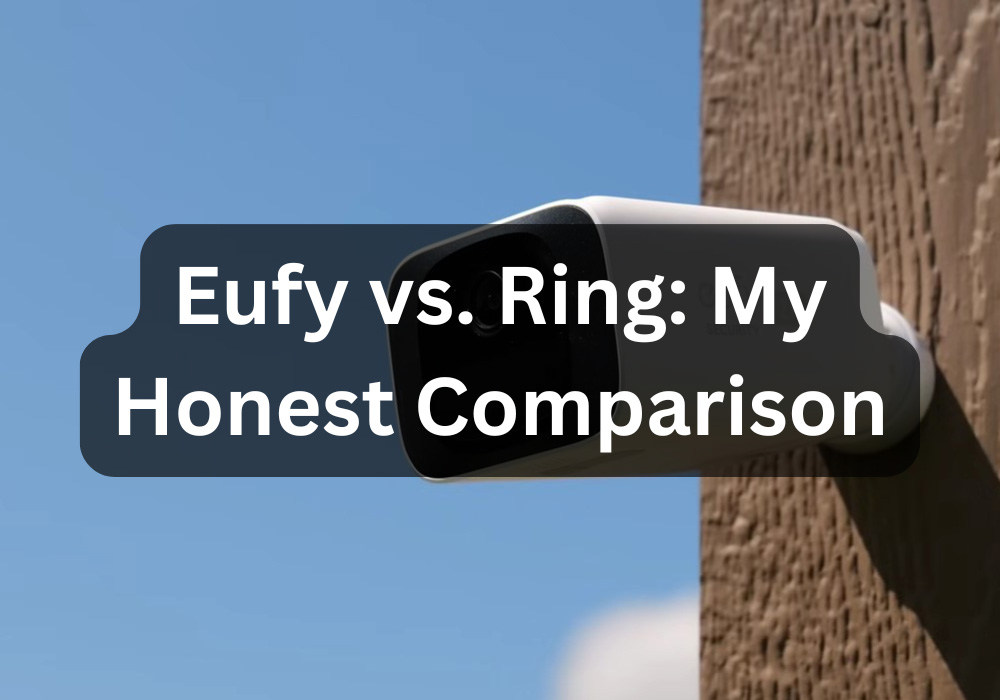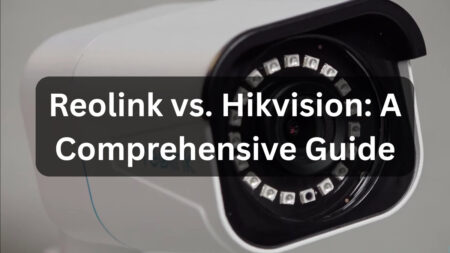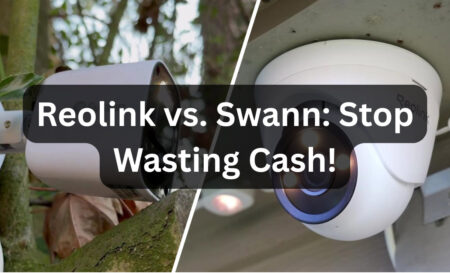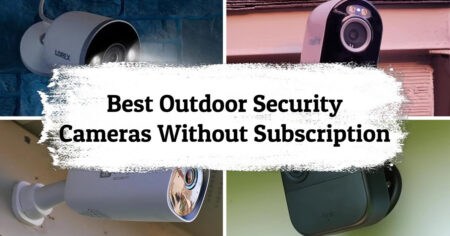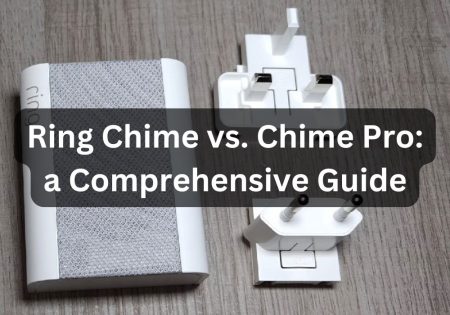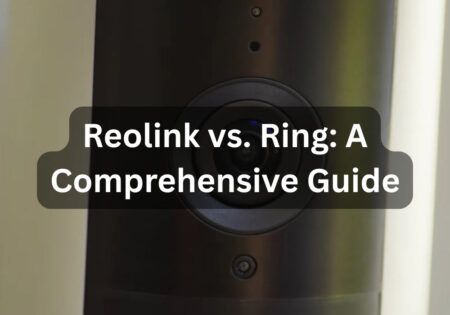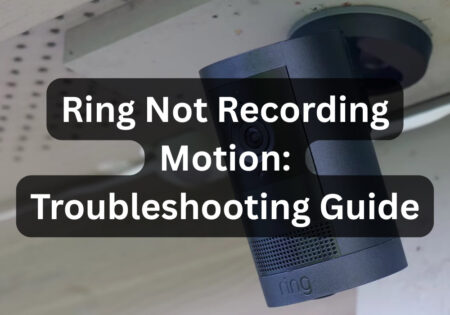Here’s your complete Eufy vs. Ring comparison! I’ve tested many smart security systems and seen how Eufy and Ring have dominated the market. They both have features like 2K video quality, local and cloud storage, AI detection, and smart home integration. So, choosing between them is a bit hard. Let’s dive in and find out which is a better option.
Which is Better, Ring or Eufy? (Quick Answer!)
| Feature | Eufy | Ring |
|---|---|---|
| Video Quality | 📷 2K or higher | 📷 Mostly 1080p (some 1536p models) |
| Storage Options | 🛠️ Local & Cloud (No mandatory fees) | ☁️ Cloud-only (Requires subscription for full access) |
| Subscription Fees | ❌ Not required | ✅ $4–$20/month (Required for features like video history) |
| Smart Home Compatibility | 🏡 Alexa, Google Assistant, Apple HomeKit (Limited ecosystem) | 🏡 Alexa, Z-Wave (More integration options) |
| Security System | 🏠 Basic, 5-piece system | 🔒 Advanced, expandable security system |
| Privacy & Data Security | 🔐 Local storage, better encryption | 🚨 Privacy concerns, data-sharing issues |
| Best For | ✅ Privacy-conscious users, higher video quality, no fees | ✅ Smart home users, full security system with monitoring |
Brands Overview: Eufy vs. Ring
Eufy: Focused on Privacy
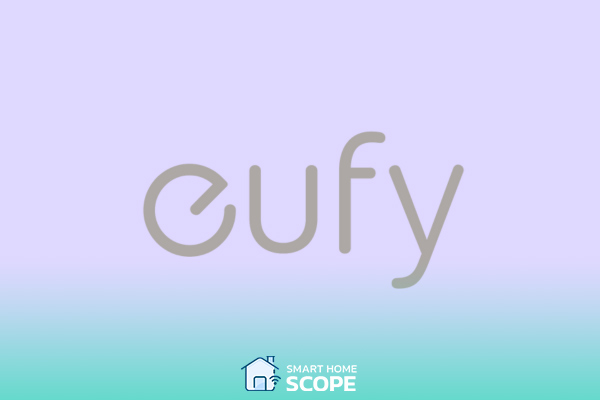
I’ve been following the Eufy brand for a long time because it has always emphasized user privacy. Unlike many other brands, it didn’t force me to buy a monthly subscription to view camera footage or use its core features. This is especially important for someone like me who doesn’t like paying extra every month.
Also Read:
Reolink vs. Eufy
Eufy offers a wide range of products, from video doorbells in wired and wireless models to cameras suitable for indoor and outdoor use. Interestingly, most of these cameras are smart and can detect body movements or even recognize faces.
Eufy also offers a series of security systems that you can expand over time; for example, you can add door sensors, motion sensors, or sirens to increase the security of your home.
But what made me like it was the ability to store camera footage locally. This means you don’t have to save your images in the cloud and worry about privacy.
Everything is stored on a central device called the HomeBase or a tiny memory card that only you can access. This feature is excellent, as I care a lot about the security of my data.
Of course, there are some disadvantages. Eufy’s mobile app isn’t as smooth and professional as some popular brands like Ring. It also doesn’t have as much support for smart assistants like Alexa or Google.
Overall, for those looking for a reliable security system with no hidden costs, Eufy is a choice worth considering.
Ring: The Smart Security Powerhouse
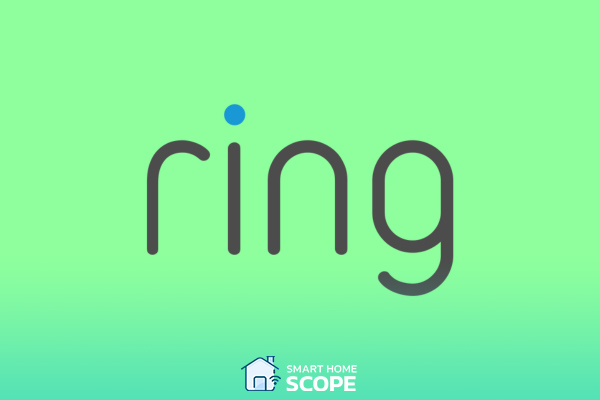
Ring is a household name. Especially since Amazon acquired the brand in 2018, everyone knows who Ring is and what it does. It’s safe to say that Ring was one of the first brands to seriously introduce smart video doorbells into people’s homes, making home security much more accessible
Unlike Eufy, which focuses on local storage, Ring relies more on the cloud. You must sign up for a monthly subscription to use all the video recording and viewing features. Without a subscription, its features are very limited.
Ring also offers a good variety of products. For example, it has different video doorbells, such as the Ring Video Doorbell Pro or a battery-powered model called the Battery Doorbell Plus. It also has security cameras inside and outside the home and even models with floodlights for the yard or entrance.
Ring offers a security system called the Ring Alarm, which you can complete with sensors, keypads, and professional monitoring options.
One thing I really liked about Ring is that it works seamlessly with Amazon Alexa. If you already have an Echo device in your home, you can easily control your cameras with your voice, which is a great feature.
Ring’s app is also one of the most powerful; it has a ton of customization options, from setting alarms to smart motion detection and a bunch of other features that are enabled via the cloud.
However, Ring has not been without its flaws. It has occasionally had security issues, such as data breaches and sharing footage with police without the user’s permission. These have led some to question the system’s privacy. While its cameras are relatively affordable, the monthly subscription fee can increase.
The Key Differences at a Glance
| Feature | Eufy | Ring |
|---|---|---|
| Storage Type | Local (HomeBase, microSD) & Cloud (optional) | Cloud-based (subscription required) |
| Subscription Fees | Not required for most features | Required for video storage & premium features |
| Video Resolution | Up to 2K | Mostly 1080p (some models reach 1536p) |
| Smart Home Integration | Works with Alexa & Google Assistant (limited Apple HomeKit support) | Best for Alexa users (limited Google Assistant support) |
| Privacy Concerns | Some past security flaws, but improved encryption | History of data-sharing and privacy breaches |
| Best For | Privacy-focused users, no subscription needed | Smart home users, Alexa integration |
In summary, Ring is the best for those who don’t mind cloud subscriptions, and Eufy wins the race of privacy and local storage.
Eufy vs. Ring: Camera Comparison
Regarding security cameras, both brands offer many options, like video doorbells and indoor and outdoor cameras. Let’s see which brand provides better video quality and overall performance.
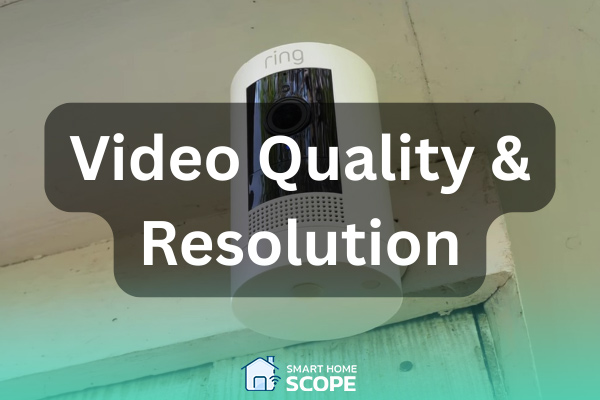
Video Quality and Resolution
One of the main differences between the Eufy and Ring was the image quality. If you care about the clarity of the videos you record, my experience is that Eufy is the hands down superior.
Eufy cameras typically record at 2K resolution, providing more detail and better quality when you zoom in. Some of their higher-end models even come close to 4K, which is pretty impressive.
In contrast, most Ring cameras record at 1080p. However, a few models, like the Ring Video Doorbell Pro 2, have higher resolutions (around 1536p).
In my use, the difference in quality was quite noticeable. For example, with the Eufy, I could easily read license plates or recognize people’s faces from a distance. Even small details were clearly visible.
Meanwhile, with the 1080p Ring cameras, the image was somewhat blurry and noisy, especially when I zoomed in or the ambient light was low. If you’re really a fan of super high-quality footages, Reolink is another solid option for you. Check out my Ring vs. Reolink guide for more information.
Ring has an interesting HDR technology on some models that helps capture images in bright or dark areas more clearly. For example, if your front door is always in direct sunlight, this feature can help prevent image burn-in and keep everything balanced.
Eufy’s sharper resolution revealed faces and license plates with striking clarity—something Ring’s 1080p just couldn’t match
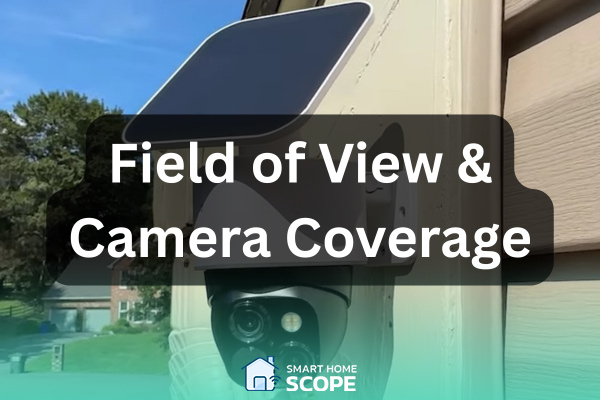
Field of View and Camera Coverage
| Feature | Eufy | Ring |
|---|---|---|
| Field of View | 125° to 160° (varies by model) | 140° to 160° (wider on average) |
| PTZ (Pan-Tilt-Zoom) | Yes, available in select models | No PTZ options |
| Dual-Lens Options | Yes, some models offer 360° coverage | No dual-lens cameras |
Another important thing to consider in our Eufy vs. Ring comparison is the camera’s field of view.
Ring cameras typically have a wider field of view, and if you want to keep a larger area in view at all times, Ring is a step ahead in this regard.
On the other hand, Eufy has a clever solution. Some of its cameras have PTZ capabilities, meaning you can remotely pan and zoom the camera to see what you’re looking for. Some models even have dual lenses, which help you cover multiple angles at once.
This feature is handy in places like a yard or parking lot because the entire area doesn’t always fit into a fixed image. You can change the camera direction whenever you want.
Ring might be a better option if you want a wide, always-on view of your space. But if you’re looking for more flexibility, Eufy, with its PTZ capabilities, can give you much more freedom.
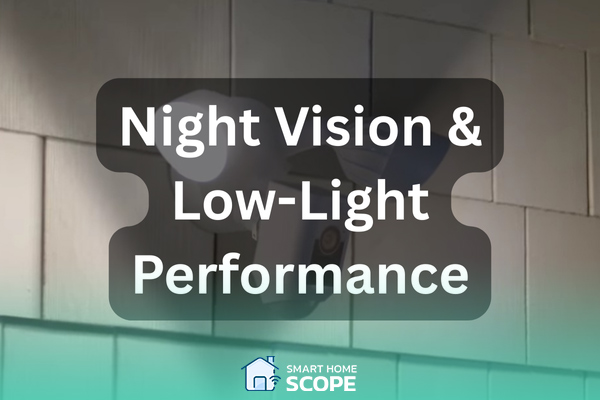
Night Vision and Low-Light Performance
Many people ignore the image quality at night, but it’s really important. Many thefts and unpleasant incidents happen when it’s dark. After using both brands, I concluded that Eufy’s night vision quality is a step ahead.
Eufy and Ring use infrared night vision technology, but the main differences are clarity and color. Some Eufy models, like the EufyCam 3, have a unique starlight sensor that allows you to see in color even at night. In night videos recorded with the Eufy, details are much clearer, and the image feels more alive.
On the other hand, Ring cameras have standard night vision, which isn’t bad but only shows in black and white. Some models also have a floodlight that, if activated, can brighten the environment and improve the image. But without that artificial light, the nighttime quality is usually noisy and unclear, especially in complete darkness.
The difference in this feature was very impressive for me, as someone who was looking for a reliable security system even at night.
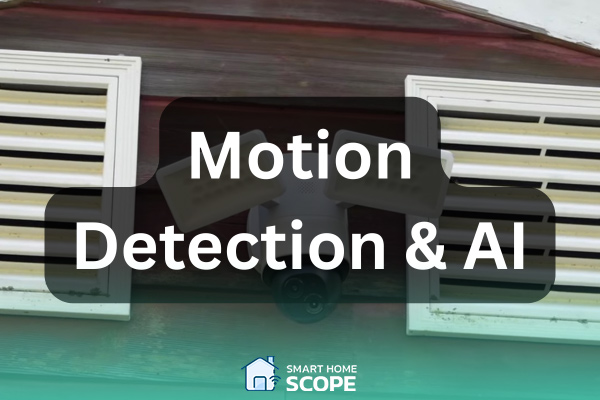
Motion Detection and AI Features
One of the most popular features in any security system is motion detection. Eufy and Ring have this feature, but what really appealed to me was the extra intelligence, and the fact that the AI features in Eufy are free.
With Eufy, many of the smart features are enabled without a subscription. For example, it can recognize faces and distinguish between family members and strangers. It can also detect when an animal has crossed the camera, not a person, or a car has moved, reducing false alarms.
Eufy can even notify you when a package is left at your door. All of this works for you without paying a monthly fee.
In comparison, Ring has similar features, but almost all are locked behind a paid subscription called Ring Protect. For example, you must activate that plan to know when someone is standing in front of the camera or when a package is being delivered.
While Ring’s motion detection quality isn’t bad, and it even has some AI-based features that reduce false alarms, it doesn’t feel good to have to pay for things that Eufy offers for free.
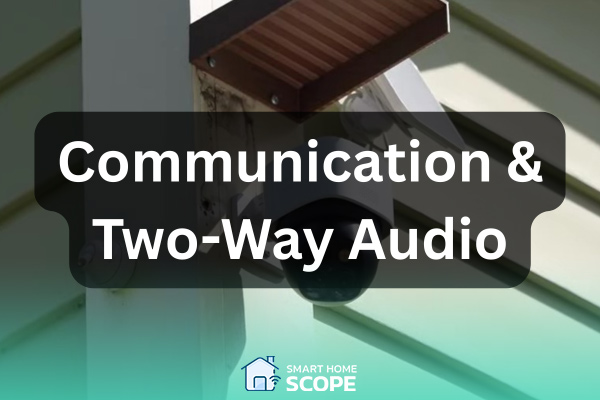
Communication and Two-Way Audio
One handy feature for everyday use is the two-way talk feature. Whether greeting a guest or giving orders to a delivery guy, talking through the camera is very useful. Luckily, both Eufy and Ring have this feature.
My experience with Eufy is that the audio quality is usually clearer, especially on the higher-end models. The sound is clear and loud, and it feels like you’re standing next to the person in front of the camera.
Ring has also implemented this feature well, but because its communication process is done through the cloud, there is sometimes a slight delay in the sound. It’s not that annoying, but you can notice it if you pay attention. However, it still has a decent performance and gets the job done.
Overall, if two-way talk is a priority for you and quality and speed are essential to you, Eufy is the best option.
Weather Resistance and Durability
Eufy and Ring outdoor cameras can resist rain and extremely low and high temperatures. However, Eufy’s cameras usually have better waterproof ratings, making them more resilient in severe weather.
| Feature | Eufy | Ring |
|---|---|---|
| Weatherproof Rating | IP65 to IP67 (highly water-resistant) | IP55 to IP66 (less resistant to heavy rain) |
| Battery Life | 3-6 months per charge | 3-6 months per charge |
| Wired & Battery Options | Yes | Yes |
Overall Camera Performance: Which is Better?
Regarding camera quality and features, I choose Eufy. It has clearer and better-quality images and offers smart features like face detection and animal detection without paying a subscription. Its night vision is also much better; you can tell in everyday use.
This doesn’t mean that Ring is weak. In fact, if you already use Amazon smart devices, Ring will sync very well with them and give you a more convenient experience.
Ring is also very easy to install and set up, making it a good choice for anyone looking for a quick, hassle-free smart home system. Its cameras also tend to have a wider viewing angle, which can be a significant advantage in some situations.
Finally, it all depends on what you’re looking for. If image quality, free smart features, and night vision are your top priorities, Eufy is a solid choice. But if ease of setup, full integration with Alexa devices, and a more straightforward experience are more important to you, Ring is also a great buy.
In the end, if crisp visuals and rich smart features top your list, Eufy delivers. But if seamless setup and deep Alexa synergy matter more, Ring is a worthy contender
Storage Options: Local vs. Cloud
One of the most important things to consider when choosing between Eufy and Ring is how they store video footage. Here, I will explain the approach of these two brands in storing data.
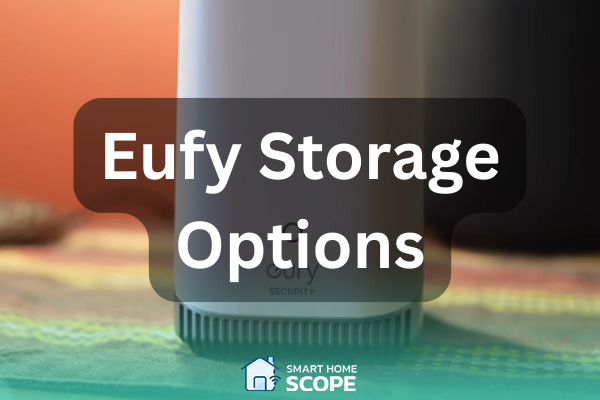
Eufy: The King of Local Storage
One thing that interested me about Eufy is its local storage system. Unlike many other brands, which essentially force you to use cloud storage and pay for it monthly, Eufy allows you to store everything locally. This means that all the video your cameras record stays with you, not on some external server where you never know who might get their hands on it.
Most Eufy cameras support microSD storage, up to 128GB. But if you buy the higher-end models, you can use the HomeBase device, which is essentially a central hub and supports up to several terabytes of space, even up to 16TB, if you want to upgrade.
Some Eufy models also have NAS connectivity, which means you can save videos directly to a network-attached storage device for long-term storage.
Of course, it also provides cloud storage if you want. It has affordable subscriptions starting at $2.99 monthly and up to $9.99 for 10 cameras. But I appreciated that smart features like facial recognition or motion alerts are not dependent on these subscriptions. They are all enabled without an extra cost.
This freedom of choice was very important to me. Not feeling like a brand is forcing you to pay a monthly fee to use the full features gives a sense of trust and peace of mind.
Plus, local storage means more privacy. I’d rather have my movies on my hard drive than on an anonymous server in another country.
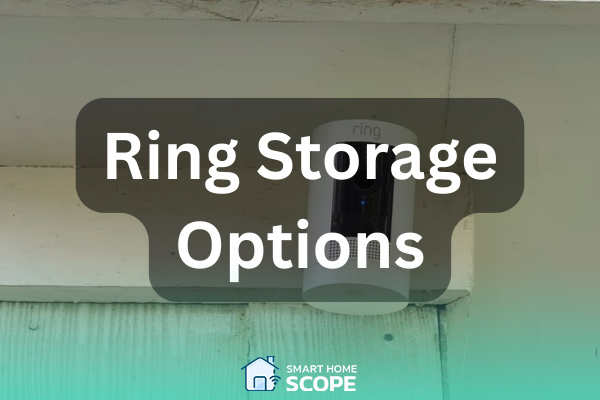
Ring: Cloud-First Approach (Subscription Required)
My experience with Ring was quite different in this regard. The brand relies heavily on the cloud and, unlike Eufy, offers no local storage options. This means that you can only watch the videos live unless you pay for a monthly subscription. Once an event is over, you lose access to that footage and have no way to review it.
Subscriptions come in different plans. The basic plan costs around $3.99 per camera monthly and keeps videos for up to 60 days. The next plan, Plus, costs $10 and lets you cover multiple cameras. If you want to use professional surveillance systems, you’ll need to upgrade to the Pro plan, which costs $20 per month.
The problem is that without these subscriptions, you will not only be unable to review the videos but also lose features like person detection, package detection, and smart notifications.
While some people may find this more convenient because they no longer have to worry about their memory being stolen or their camera crashing and everything being stored in the cloud, having to pay a monthly fee to access my videos was annoying for me.
Ring’s cloud storage is stable and works well if you don’t mind the monthly fee. But if you want full and permanent control over your files and don’t want to pay extra for every simple feature, Eufy is a better choice.
Which Brand Has Better Storage Options?
If I were to consider the storage and privacy issue, Eufy would be my clear winner. I like the videos I record from my home to be mine alone, not stored on an external cloud where there’s always the possibility of data leaks or unwanted access.
On the other hand, you don’t have to pay a monthly fee to access the smart features or your recordings. Everything is in its place and gives you a complete sense of ownership.
I understand that convenience is more important for some people than not worrying about running out of storage or still being able to access files if the camera is stolen. Ring is a simpler, hassle-free choice if that’s your thing and you don’t mind the subscription fee.
For those who seek privacy and autonomy, Eufy reigns with local storage and no subscription binds. For those who favor effortless convenience and cloud access, Ring offers a fluid, hassle-free experience
Eufy vs. Ring: Unique Features and Smart Home Integration
When comparing Eufy vs. Ring, it’s not just about cameras and storage; it’s also about the extra features that enhance your smart home security experience. Let’s talk about AI-powered detection and smart home compatibility.
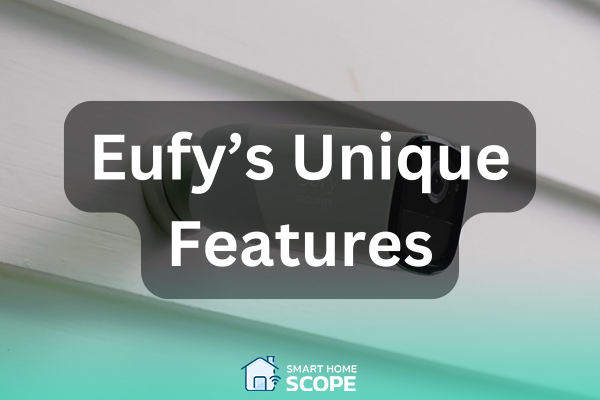
Eufy’s Unique Features: AI and Local Intelligence
When looking for a security system for my home, I wanted to ensure that my privacy was protected and that I didn’t have to pay a monthly subscription fee.
What attracted me to Eufy is that it cares about privacy and has a bunch of smart features that make it much easier to use. The cool thing is that most of its advanced features are available without a subscription.
Advanced AI Detection (No Subscription Required)
One of the things that caught my eye about Eufy’s cameras is that they use AI directly on the device itself. This means they’re both more secure and faster.
The good thing is that unlike brands like Ring, which require you to buy a subscription to activate their smart features, Eufy gives you these features for free.
For example, some models can distinguish familiar faces from strangers or understand whether the movement the camera has detected is related to a person, an animal, or a car. This reduces false alarms by a lot.
Eufy can even detect sounds like a baby crying, breaking glass, or an alarm. It will quickly notify you when your package is left at your door, or someone picks it up. All this without having to pay a monthly fee.
Smart Integration with HomeKit (Apple-Friendly)
What I found interesting about Eufy was its compatibility with Apple HomeKit. I use Apple products, and it was important to me to easily control everything through the Home app.
Some Eufy models support HomeKit Secure Video, which means you can securely store videos in Apple’s cloud. Plus, it’s compatible with Siri, so you can control your camera or check on your home with just a few words.
There was no cloud storage requirement, meaning the videos remained private and out of reach. For someone like me who is entirely in the Apple ecosystem, this is a massive advantage over brands like Ring that don’t work with HomeKit.
Unique Products: Smart Locks, Garage Cams and Baby Monitors
One of the things I found interesting about Eufy is that it doesn’t just sell cameras! It also has other products that combine smart and security features in one device.
For example, I saw its smart lock with a camera and a fingerprint scanner; you can both open the door and see who’s at it.
Another product for parking lots is a camera that can open and close the garage door. There’s even a special camera for babies that detects crying and tracks their movements.
You don’t see this kind of versatility in brands like Ring, so if you’re looking for a versatile smart home system, I think Eufy is a better choice.
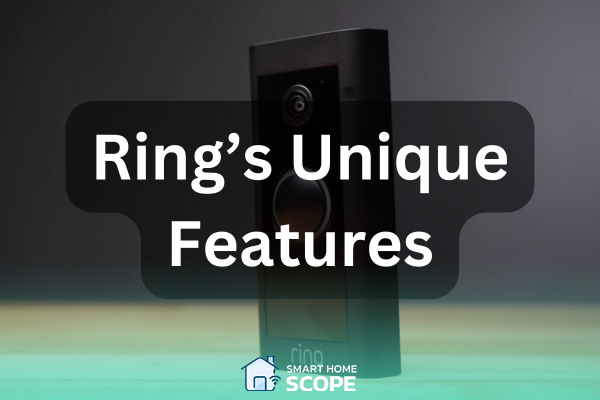
Ring’s Unique Features: Cloud AI and Amazon Integration
Ring relies more on cloud-based AI with powerful features that set it apart, especially for Amazon users.
Advanced AI Features (But Requires Subscription)
Ring does have some AI features like Eufy, but there’s one crucial difference. You’ll need to purchase a Ring Protect subscription to use these features on Ring. For example, the ability to only alert when a person is in the picture or to detect packages left at the door is only available with that subscription.
There’s even an option to specify which part of the camera image is important to you and only alert you to that part. While these are useful, I don’t like paying a monthly fee to use many basic features. In that sense, Eufy is much more affordable.
Amazon Alexa and Echo Show Compatibility
If you have several smart devices that work with Amazon and Alexa, Ring could be a better option because Amazon’s own is fully compatible with devices like the Echo Show or Fire TV. For example, you can easily see the camera’s live image or activate or deactivate your security system with a voice command.
You can even automate tasks using Alexa Routines, such as turning on your lights when detecting motion. Eufy also works with Alexa, but it’s a bit more limited. So, if your home is built with Amazon’s ecosystem in mind, Ring is a better choice.
Ring’s Unique “Bird’s Eye View” and Virtual Security Guard
One thing that sets Ring apart from Eufy is that it only has a few unique features on its models.
For example, it has a feature called Bird’s Eye View, which is available on its more advanced cameras. It uses radar technology to track people’s movements in front of your house. This means it shows you exactly where that person came from and where they went.
There’s also a Virtual Security Guard feature for those who want to be extra secure. In this mode, a real team of guards will monitor motion alerts 24/7.
This is a good option for businesses or people who are very security-conscious. But like many of Ring’s other features, these aren’t available without a subscription. Ring is a better choice if you’re looking for advanced, professional features and don’t mind paying a monthly fee.
Which One Has Better Smart Features?
| Feature | Eufy | Ring |
|---|---|---|
| AI Detection | ✅ Free (On-Device) | ❌ Requires Subscription |
| Facial Recognition | ✅ Yes | ❌ No |
| Pet & Baby Detection | ✅ Yes | ❌ No |
| Apple HomeKit Support | ✅ Yes | ❌ No |
| Alexa Compatibility | ✅ Limited | ✅ Full Alexa Integration |
| Smart Lock / Garage Cam | ✅ Yes | ❌ No |
| Bird’s Eye View Tracking | ❌ No | ✅ Yes |
Final Thoughts on Smart Features
If you’re looking for cameras that use AI and don’t require a subscription, Eufy is a better option. But if you’re in the Alexa ecosystem or want Ring’s proprietary AI features, Ring might be a good option, as long as you don’t mind paying a monthly fee.
Comparing Eufy vs. Ring, it can be said: for AI without strings, Eufy prevails. Ring suits Alexa loyalists, if the monthly fee doesn’t faze.
Ring vs. Eufy Home Security Systems: Which One Offers Better Protection?
Regarding full home security systems, Eufy and Ring don’t just stop at cameras. They also offer features like alarm kits, sensors, and professional monitoring services. This means you can build a comprehensive, all-encompassing security system for your home. But which one is the better choice?
| Feature | Eufy Security System | Ring Security System |
|---|---|---|
| Starter Kit Options | 5-piece kit | 5, 8, 10, or 14-piece kits |
| Professional Monitoring Cost | $10/month (via Noonlight) | $20/month (Ring Protect Pro) |
| False Alarm Forgiveness | Yes | No |
| Local Storage for Security Footage | Yes | No |
| Cloud Dependency | No (local-first system) | Yes (requires cloud for full features) |
| Smart Home Integration | Apple HomeKit, Alexa, Google Assistant | Alexa, Z-Wave (works with third-party smart home devices) |
| Cellular Backup for Internet Outages | No | Yes (included in Ring Protect Pro) |
| Wi-Fi 6 Router Included | No | Yes (Ring Alarm Pro) |
| Expandability (Smoke, CO2, Flood Sensors, etc.) | Limited | Extensive (Supports Z-Wave devices) |
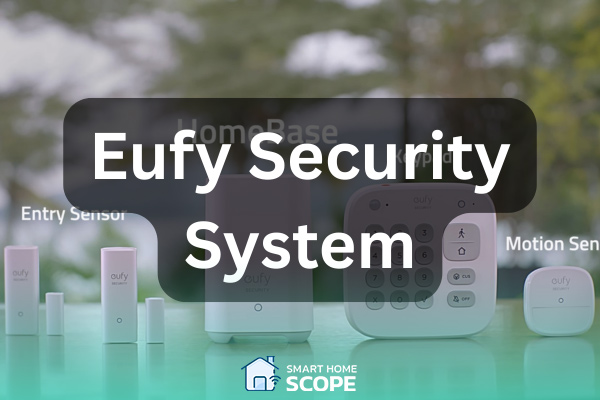
Eufy Security System: Flexible and Subscription-Free
Eufy is a straightforward and flexible security system with no mandatory subscriptions. The brand offers a five-piece security kit with a keypad, motion sensors, and door and window sensors.
What’s cool about this system is its customization. That means you can start with the basics and gradually expand the system by adding motion sensors, cameras, or alarms.
One of Eufy’s main advantages is its local storage and offline capabilities. Unlike Ring, which relies more on cloud services, Eufy allows you to store security footage and settings locally. This gives you a sense of security and more control over your data without relying on cloud services.
Another thing I like is the false alarm forgiveness system. If an alarm is accidentally triggered, the monitoring service doesn’t immediately send a message to the authorities. Instead, it gives you time to cancel the false alarm. This is a smart feature that prevents panic or potential fines.
Eufy’s monitoring costs are also much lower than Ring’s. While Ring charges $20 monthly for professional monitoring, Eufy offers a more affordable plan that costs just $10 per month through Noonlight, an independent emergency response service. So, if you’re looking for professional monitoring at a lower cost, Eufy is an excellent option.
Eufy’s security system isn’t as complete as Ring’s. It doesn’t have flood or smoke sensors, for example, or advanced smart home integration. If you’re looking for a full security package for your smart home, Eufy is limited.
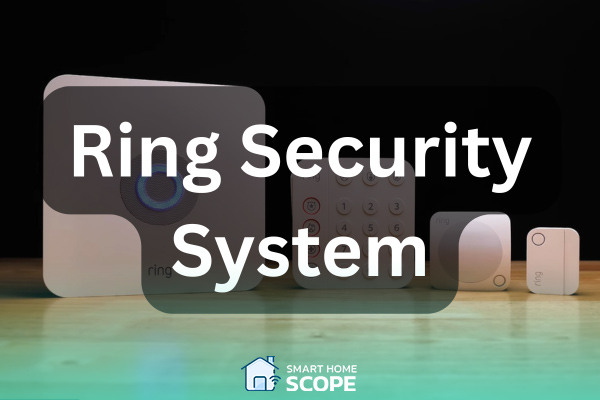
Ring Security System: More Devices and Smart Home Integration
Ring, you see, takes a more advanced, connected approach to systems. The Ring Alarm security system comes in several configurations, from five-piece to fourteen-piece kits. That means you have various options, whether you’re looking for basic security or full coverage for your entire home.
Also Read:
Best Smart Home Security Systems
One of the biggest advantages of the Ring security system is that it works with Z-Wave devices. This means you can connect third-party smart devices, such as smart locks, flood sensors, smoke detectors, or carbon monoxide alarms, to the system. Ring is a very expandable security system that quickly adapts to various smart devices.
Another feature that makes Ring different is the Ring Alarm Pro. In addition to being a security system, this device is also a Wi-Fi 6 router. This means your network coverage will be better, and even if the internet goes down, your security devices and cameras will still be connected. Something that Eufy doesn’t offer.
Ring even has a device called Ring Chime. Its job is to alert users with customized notifications whenever somebody presses your doorbell. For more info, you can read my Ring Chime vs. Chime Pro guide.
In terms of monitoring, Ring has a 24/7 professional monitoring plan for $20 per month. It’s more expensive than Eufy’s option. However, it includes cellular support, meaning your security system will still work even if your Wi-Fi goes down. Ring is a much better option for those seeking a security system with robust, always-on support.
There is one downside, though, and that is Ring’s heavy reliance on cloud services. Unlike Eufy, which supports local storage, most of Ring’s features require a subscription.
Without purchasing the Ring Protect Plan, you won’t be able to record or review past events and lose access to advanced AI features. This could be a problem if you’re looking for a system that works without additional costs.
Which Home Security System is Better?
If you’re looking for a simple, affordable, subscription-free security system, Eufy is a better choice. It offers good protection, with local storage and low monitoring costs, which is excellent for those who don’t want to rely on cloud services.
On the other hand, if you’re looking for more advanced smart home integrations, more expandability, and a more professional security system, Ring is a better choice.
Compatibility with Z-Wave devices, cellular support, and Ring Alarm Pro make Ring a versatile security solution. However, you should be prepared for the higher costs and cloud-based reliance.
Eufy suits the frugal minimalist, offering local security without strings. Ring, rich in features and smart home finesse, demands deeper pockets and trust in the cloud
Privacy and Controversies: Are Eufy and Ring Safe Choices?
When it comes to home security, privacy is just as important as security. After all, what’s the point of securing your home if your security system is weak and could be hacked or your data leaked? Eufy and Ring have had serious privacy issues, and it’s important to know exactly what happened and whether they could fix them.
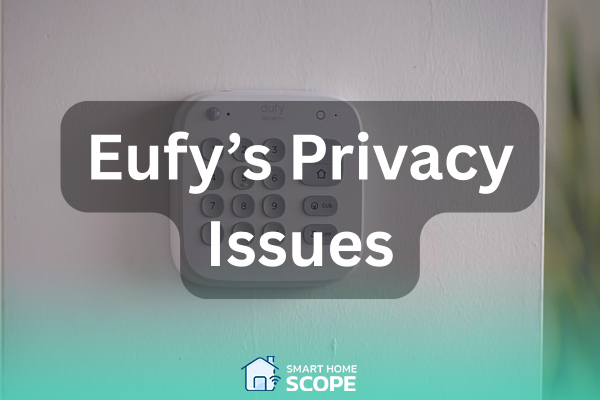
Eufy’s Privacy Issues: The Cloud Controversy
Eufy has always positioned itself as a brand that prioritizes user privacy, touting features like local storage, data encryption, and no subscriptions to make customers feel more secure and in control of their data.
However, in November 2022, when Paul Moore, a security researcher, discovered that Eufy cameras automatically uploaded images and facial recognition data to cloud servers even when users had not enabled the cloud storage option, serious problems arose for the brand.
The problem got even worse when it was discovered that Eufy camera feeds were accessible via unencrypted web links. This meant that people with enough technical knowledge could easily access security footage without needing authentication.
This completely violated Eufy’s claims about privacy and security and caused many users to doubt and lose trust in the brand.
Eufy took steps to address the issues following the security crisis. One of the first things it did was enabling end-to-end encryption (E2EE) for all of its camera feeds so that no one could access the information without permission.
They also updated its web portal to use WebRTC encryption to secure users’ online information further. The company also clarified its cloud storage policies and data retention practices to give users more information about how their data is processed.
While these changes have improved security, many users still feel distrustful. The lack of transparency about data storage practices and security policies makes it difficult for them to trust the brand again.
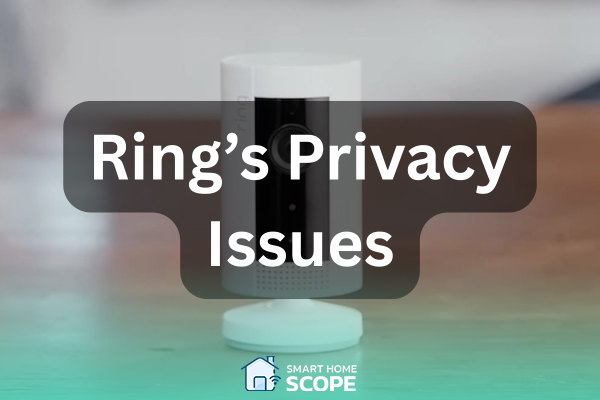
Ring’s Privacy Issues: A History of Violations
While the Eufy controversy was serious, Ring’s privacy history is arguably worse. The Amazon-owned brand has been involved in several privacy scandals. One of the worst involved a former Ring employee who accessed users’ cameras and spied on them, especially women, without their knowledge.
This led to an FTC investigation, which found that Ring did not implement adequate security protocols to protect users’ privacy. As a result, in May 2023, Ring was forced to pay $5.8 million in damages.
In addition to internal breaches, Ring has faced other privacy issues. One of those issues was security weaknesses that allowed hackers to hack into users’ cameras and, in some cases, harass families through those same devices.
The company has also been accused of sharing recorded videos with law enforcement without users’ permission, raising concerns about government surveillance and transparency.
Another big problem is that Ring requires cloud storage to use its core features, meaning Amazon has full access to recorded videos unless users manually delete them.
Unlike Eufy, which offers minimal local and offline storage options, Ring’s business model relies entirely on cloud storage and data sharing, which increases serious privacy concerns.
Which Brand is Safer for Privacy?
If privacy is a big concern, Eufy is the best option. While the brand has had its share of issues in the past, it has taken steps to address them. One of its standout features is its local storage, which gives you more control over your security information and images rather than relying on cloud storage.
This method ensures that your data remains only on your device, and you don’t need to worry about being hacked or having unauthorized access to your information.
On the other hand, Ring may raise user concerns due to its history of privacy violations, data sharing, and security issues.
Because Ring forces users to use cloud storage, there are risks such as unauthorized access to your videos by hackers, law enforcement, or even Ring employees. This can be a concern for those who value their privacy.
If you decide to use Ring, there are a few things you can do to increase your security. One of the most important is to enable two-factor authentication (2FA). This will prevent unauthorized access to your account and provide additional protection.
It’s also a good idea to disable cloud recording. This will help ensure that recorded videos are stored only on your device and are not easily accessible. Additionally, manually deleting videos can prevent the risk of unauthorized access.
Finally, using Ring’s privacy settings to restrict data sharing can help you have more control over your personal information.
Privacy and Security Comparison Table
| Privacy Concern | Eufy | Ring |
|---|---|---|
| Local Storage Available? | ✅ Yes | ❌ No (Cloud-only) |
| End-to-End Encryption (E2EE)? | ✅ Yes (after updates) | ❌ No (Limited encryption) |
| Past Security Breaches? | ⚠️ Yes (Cloud uploads without user consent) | 🚨 Yes (Multiple major breaches) |
| Shared User Data with Police? | ❌ No | ✅ Yes (Without user consent) |
| Known Hacker Exploits? | ❌ No major hacks | ✅ Yes (Multiple hacker incidents) |
| Employee Privacy Violations? | ❌ No known incidents | 🚨 Yes (Employees spying on users) |
Final Verdict on Privacy and Security
At this point, Eufy is the winner. While the 2022 scandals damaged its reputation, the company responded with security improvements and still offers local storage, which gives you complete control over your data.
On the other hand, Ring has a history of privacy violations, including account hacks and police surveillance of videos. Ring may not be the right choice if you’re concerned about who can access your home security footage.
The Verdict: Which One Should You Choose?
After comparing Eufy and Ring in several categories, such as camera quality, storage options, features, home security systems, and privacy, your choice ultimately depends on your priorities for a home security system.
Go with Eufy for Better Video Quality and Local Storage
In my experience, Eufy cameras always deliver high-resolution, more detailed, and better-quality images. One of the brand’s standout features is the ability to store local data without a monthly subscription.
If you value privacy and prefer complete control over your recorded videos, Eufy is a good choice, as it doesn’t force you to use cloud storage services in any way.
Along with these benefits, another positive I’ve seen from Eufy over time is the long-term financial savings. While some cameras may cost more upfront than others, you’ll save money over time with no mandatory subscriptions.
But just like no brand is perfect, Eufy has a few weaknesses. One of the biggest limitations is that it doesn’t have as many smart home integrations as Ring. In other words, if you’re looking for a security system that easily integrates with your other smart home devices, Eufy may not quite meet your expectations. Also, Eufy’s security system is relatively simple. It may seem limited to those seeking more advanced features and expandable capabilities.
Privacy controversies still worry some users in 2022. These people may be skeptical about the brand’s data transparency policies and, therefore, find it challenging to trust Eufy fully.
Go with Ring if You Want Smart Home Integration & a Full Security System
While Eufy excels in video quality, resolution, and storage flexibility, Ring is a better option if you’re looking for a comprehensive, advanced home security system.
Ring’s security kits are more advanced and expandable, and they also allow for professional surveillance with features like cellular network support and compatibility with smart home devices via Z-Wave.
Ring is also a better option for Alexa users because it’s an Amazon-owned brand that works seamlessly with Echo devices, Fire TVs, and other smart home devices.
But Ring has some weaknesses. Privacy concerns are one of its major issues, especially when sharing data with law enforcement. Also, its reliance on cloud storage forces you to pay monthly subscriptions. Finally, Ring’s video quality is improving, but it still lags behind Eufy in terms of clarity and sharpness.
My Final Recommendation
As I looked at Eufy and Ring and read real user reviews, I gradually felt that Eufy was more in line with what I wanted from a security system. The main reason is that its cameras have high image quality, and most importantly, it doesn’t require a monthly subscription to use all its features.
The fact that you can store videos locally and have complete control over them makes you feel like you have absolute security in your hands, not in the hands of a cloud server you might be suspicious of.
But let’s be realistic. Eufy is excellent for a simple, reliable, and uncomplicated system. But if someone wants a truly expansive and advanced smart home that can integrate with a bunch of different devices or a system with 24/7 professional monitoring capabilities, then Ring is a more logical choice. Just be aware that these features come with monthly fees and some privacy concerns.
Ultimately, the choice between these two brands comes down to what you want: peace of mind and cloud independence or full smart home integration and more features, but at a higher price and compromise.
Final Thoughts
This was my complete Eufy vs Ring guide! Eventually, whether you choose Eufy or Ring, both are great options for protecting your home. Still, you should know that each is suited to a specific type of user. You should take your own needs and preferences into account and based on them, choose between Ring and Eufy.
